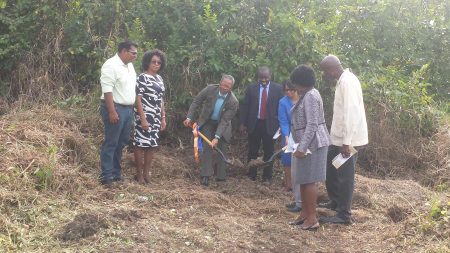This week’s ceremonial turning of the sod preparatory to the construction of a complex in which to house the Government Analyst-Food & Drugs Department (GAFDD) would appear to signal the beginning of the end of the marginalization of a key state agency which has spent just a few years short of a decade performing critical functions utilizing makeshift accommodation on the University of Guyana’s Turkeyen Campus.
The information disseminated by government is that the new GA-FDD Complex will be erected at a cost of $130 million and will include a state-of-the art laboratory and a pristine administrative complex that will cost $110 million. The remainder of the total budgeted will be used to acquire laboratory supplies, quality control equipment, proficiency-testing material and other critical items.
The more critical issue, however, will be just how long it will take to have the new facility up and running given the Spartan conditions under which it has been operating for several years.

Established in the late 19th century specifically to serve the quality assurance needs of the sugar industry, the GA-FDD was, in 2007, unceremoniously removed from its location in Kingston where it had been since 1993 and re-located to Turkeyen to make room for the Marriott Hotel. It has been languishing there, ill-equipped to perform all of its essential functions and plagued by cramped working conditions, poor ventilation, unreliable power and water supply and disjointed administrative arrangements.
The ‘salvaging’ of the GA-FDD is a collaborative initiative between the Ministry of Public Health and the University of Guyana’s Faculty of Natural Sciences and Health Sciences. It seeks, official sources say, to better position the GA-FDD to fulfill its mandates relating to the inspection, testing and accreditation of foods, drugs and cosmetics being produced for local consumption and export as well as those being imported for use here.
There is every reason to hasten, as far as possible, the completion of the new GA-FDD Complex. This week’s turning of the sod at Turkeyen comes at a time when the Department is under pressure to authenticate the quality of foods and drugs consumed locally as well as foods destined for export markets. GA-FDD Director Marlan Cole told Stabroek Business this week that the advent of the US Food Safety Modernization Act (FSMA) and the attendant regulations governing food importation into the United States have entrusted greater responsibility on the Department. He said that the GA-FDD had an “equally great responsibility” to ensure that foods, drugs and cosmetics consumed locally were “safe and reliable.” According to Cole a new, modern GA-FDD complex would allow the department to significantly improve the quality of its service in “key and critical areas” including trade facilitation, perusal of key imports and providing certificates of analysis for various types of foods. He said that a new complex would also enable the Department to conduct more regular food safety training exercises and to issue import and manufacturing licences to local companies engaged in the processing of food, drugs and cosmetics.
“With the completion of the new complex we will be able to withstand international scrutiny and our locally made products will be able to access international markets without running the risk of query or rejection,” Cole added.
The new complex is expected to be completed in 2019.




